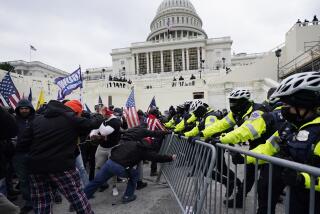Justices Limit Informants Use for Convictions
- Share via
WASHINGTON — The Supreme Court, by a 5-4 vote, today limited the power of law enforcement authorities to obtain convictions based on statements given to police informants.
The justices ruled in a case from Maine that such statements may not be used as evidence against the person who makes them even when that person initiated contact with the informant.
The court 21 years ago prohibited the use of incriminating statements “deliberately elicited” from indicted defendants by informants.
Led by Justice William J. Brennan Jr., the court today refused to limit that ruling to situations in which government agents, and not suspects, initiate the contact with indicted defendants.
Counsel Necessary
“Knowing exploitation by the state of an opportunity to confront the accused without counsel being present is as much a breach of the state’s obligation not to circumvent the right to assistance of counsel as is the intentional creation of such an opportunity,” Brennan said.
Justices Thurgood Marshall, Harry A. Blackmun, Lewis F. Powell Jr. and John Paul Stevens joined Brennan’s opinion.
Chief Justice Warren E. Burger and Justices Byron R. White, William H. Rehnquist and Sandra Day O’Connor dissented. Writing for the four, Burger accused the majority of creating “a new ‘right’ only for those possibly habitual offenders who persist in criminal activity even while under indictment for other crimes.”
Airline Damages
In other action, the court:
--Refused to shield airlines from paying interest on damages arising from crashes related to international travel.
By a 4-4 vote, the justices upheld a federal appeals court ruling that assessed what is now 10 years worth of interest on a judgment against Eastern Air Lines stemming from a 1975 crash in New York.
--Ruled that members of federal prison disciplinary committees may be sued for violating inmates’ rights.
In a 6-3 ruling, the court rejected the Reagan Administration’s position and upheld awards of $4,500 to two former federal prisoners in Indiana who were placed in solitary confinement for allegedly advocating a prison work stoppage.
More to Read
Get the L.A. Times Politics newsletter
Deeply reported insights into legislation, politics and policy from Sacramento, Washington and beyond. In your inbox twice per week.
You may occasionally receive promotional content from the Los Angeles Times.










